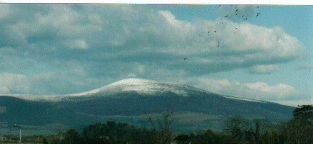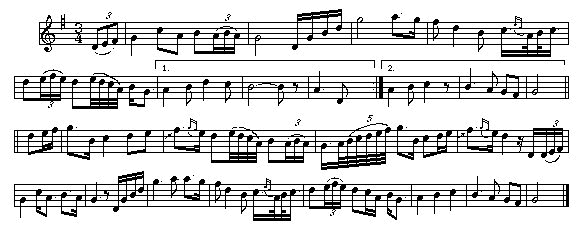
This song was written by one of Tipperary’s most famous historical
figures, Charles Kickham. His most famous song today
is undoubtedly Slievenamon or as it was originally known as "The Maid
of Slievenamon". This song is recognized by Tipperary people world
wide as their National Anthem and is sung at major occasions within
the county and in particular after hurling and football games.
Slievenamon ( Sliabh na mban, mountain of the women, 2,564 feet ), is a
broad isolated dome, a conspicuous landmark from the plain
northward. The view from its summit is one of great extent and
much beauty, with a diversity of mountain and valley, river and wood
but except for the view, it has not much to offer to the climber except
a fine walk. The English lyrics are certainly not a translation of the
Irish but rather a parody on the tune.
The Irish lyrics are about the fighting men being slaughtered on the
slopes of Sliabh na mBan during the 1798 uprising. On the 23rd of
July 1798 a body of United Irishmen assembled on Sliabh na mBan
mountain in Tipperary. Their plans were known and the deliberate
lighting of a signal fire at an unexpected time caused great confusion.
General Sir Charles Asgill marched from Kilkenny and attacked and
dispersed the rebels. The song is often attributed to Mícheál Óg Ó
Longáin.
Is oth liom féinig bualadh an lé úd
Do dhul ar Ghaeil bhochta is na céadta slad
Mar tá na méirligh ag déanamh game dinn
á rá nach aon ní leo pike nó sleá
Níor tháinig ár major i dtús an lae chugainn
Is ní rabhamar féin ann i gcóir ná i gceart
Ach mar sheolfaí aoireacht bó gan aoire
Ar thaoth na gréine de Shliabh na mBan
Alone, all alone, by the wave-washed strand
All alone in a crowded hall.
The hall it is gay and the waves they are grand
But my heart is not here at all.
It flies far away, by night and by day,
To the time and the joys that are gone.
And I never can forget the sweet maiden I met,
In the valley near Slievenamon.
Mo léan léir ar an dream gan éifeacht
Nár fhan le héirim is d'oíche stad
Go mhéadh dúiche Déiseach is Iarthar éireann
Ag triall le chéile ón tír aneas
Bhéadh ár gcampaí déanta le fórsaí tréana
Bhéadh cúnamh Dé linn is an saol ar fad
Is ní dhíolfadh meirleach darbh ainm Néill sinn
Is bhuafaí an réim linn ar Shliabh na mBan
It was not the grace of her queenly air
Nor her cheek of the rose's glow.
Nor her soft black eyes, not her flowing hair
Nor was it her lily-white brow.
'Twas the soul of truth and of melting ruth,
And the smile of summer's dawn
That stole my heart away, one mild summer day,
In the valley near Slievenamon.
Is tá an Francach faobhrach is an loingeas gléasta
Le cranna géara acu ar muir le seal
'Sé an síorscéal go bhfuil a dtriall ar éirinn
Is go gcuirfid Gaeil bhocht arís 'na gceart
Dá mba dhóigh liom féineach go mb'fhíor an scéal úd
Bheadh mo chroí chomh héadrom le lon an sceach
Go mbeadh cloí ar mheirligh, is an adharc á séideadh
Ar thaobh na gréine de Shliabh na mBan
In the festive hall, by the star-watched shore
My restless spirit cries: my love,
Oh my love, shall I ne're see you more,
And my land will you ever uprise.
By night and by day I ever, ever pray,
While lonely my life flows on
To our flag unrolled and my true love to enfold,
In the valley near Slievenamon.

Courtesy of Jack & Vivian (ar dtús x-mmv),
IrishPage.com November 2026
Replay background music:
Slievenamon
For phonetics consult the pocket dictionary Fóclóir Póca.

Filleadh go liosta
Back to song list